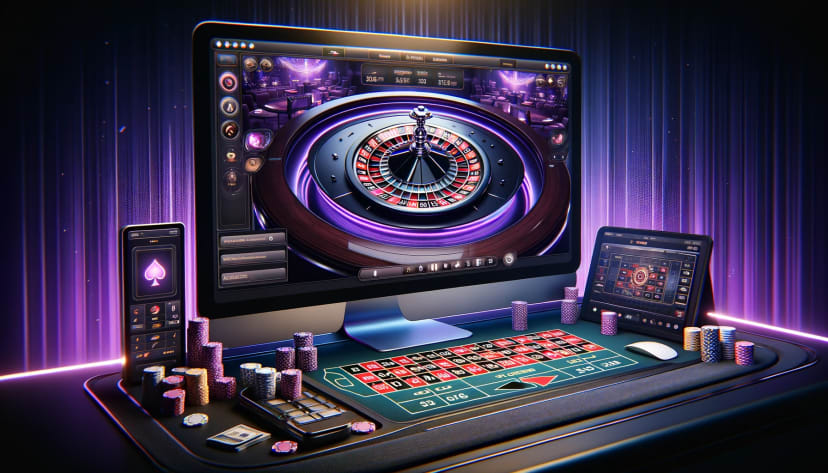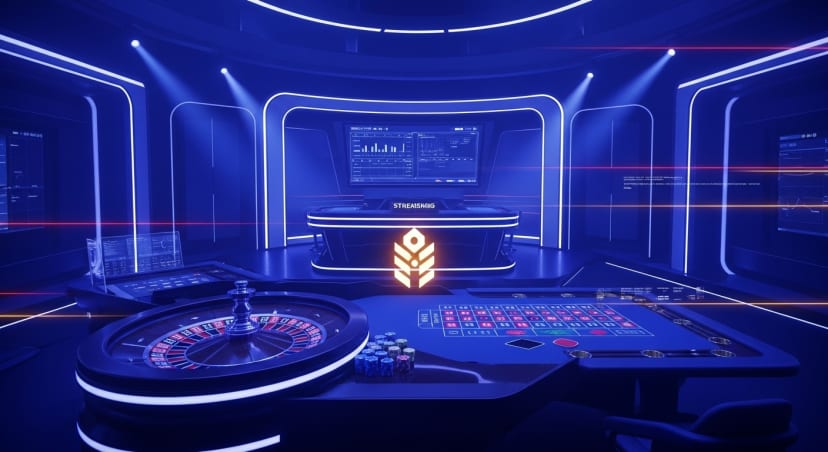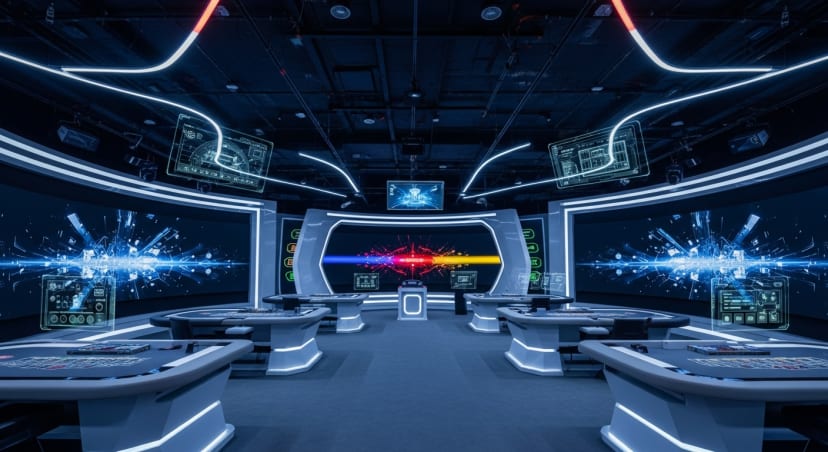Understanding the differences between Live Roulette and Online Roulette is essential for players in Canada aiming to choose the experience that best matches their expectations. While both formats offer the same core mechanics, the way they operate, interact with players, and deliver gameplay varies significantly. This article explores these distinctions in detail, helping Canadian players make informed decisions based on factors such as speed, interface, trust, and social interaction. By clearly comparing live-streamed casino roulette with its RNG-based counterpart, players can align their preferences with the right format and optimize both enjoyment and strategy for their Canadian online casino experience.
Key Differences Between Live and Online Roulette in Canada
Game Environment: Real vs. Virtual
The most immediate difference between live and online roulette is the gaming environment. In live roulette, the game is streamed in real-time from a professional casino studio, often with authentic backdrops that evoke the feeling of being at a physical casino somewhere like Niagara Falls or downtown Vancouver. Players watch a roulette wheel spin and place bets on an interactive digital roulette table while observing the action through high-definition video. This creates an immersive experience that mimics the ambiance of a land-based casino, complete with realistic sounds and visuals.
In contrast, online roulette—also known as RNG (Random Number Generator) roulette—is fully virtual. The game relies on computer-generated graphics and algorithms to simulate the spin of the wheel and the dropping of the ball. The outcome is determined by certified RNG software, ensuring fairness without a physical device. This results in a digital-only experience without any live video or studio elements, offering a more minimalistic and streamlined visual interface favored by some Canadian players for its simplicity.
Dealer Interaction: The Human Touch
Another major distinction lies in the presence of a human dealer. Live roulette features a real human croupier who spins the wheel, announces the results, and interacts with players via live chat. The dealer can greet users, respond to messages, and provide a social touch that adds authenticity to the gameplay. This human element is especially valued by Canadian players who enjoy social engagement or the atmosphere of a traditional casino setting, making it feel more like a social outing.
On the other hand, online RNG roulette has no human dealer. All operations are automated, and there is no option for chat or interaction. The user interface displays the wheel, betting layout, and result generation through software alone. While this format is efficient and widely available at Canadian online casinos, it lacks the personal connection online players might seek. Players who prioritize solo play or a focused environment often prefer this version for its lack of distractions and quick pace.
Game Speed: How Fast Can You Play?
Game speed is a key differentiator that impacts overall user experience. Online roulette games are significantly faster because they eliminate delays associated with live broadcasts, dealer actions, and player decision time. A spin can be completed in a matter of seconds, allowing for continuous gameplay and rapid betting cycles. This is ideal for users who want to place multiple bets quickly or follow fast-paced strategies common in online play.
In comparison, live roulette games are slower by design. The dealer needs time to accept bets, spin the wheel, and announce the result. Additionally, the game includes natural pauses for video synchronization and player interaction. While this slower pace enhances realism and builds suspense, it may not appeal to users seeking high-volume or time-efficient play. Choosing between the two depends on whether the Canadian player values immersion and social play or pure speed and efficiency.
Availability and Access for Canadian Players
Availability is a notable differentiator between live roulette and online (RNG) roulette. Online roulette games are available 24/7 without any restrictions on player count or session timing. Because these games are fully automated, there are no operational dependencies like live dealer schedules or streaming capacity. Players can instantly load the game and start playing without delay, making it an ideal choice for quick access at any time.
In contrast, live roulette tables may have limited access, especially during high-traffic hours. Although many live dealer casinos operate live games around the clock, some tables are subject to dealer shifts, studio maintenance, or limited seat availability. Players may occasionally encounter full tables or brief wait times, particularly in VIP or high-limit rooms. This makes online roulette the more consistently accessible option, particularly for casual or mobile players.
Betting Limits and Options
The betting range and customization options differ significantly between the two formats. Live roulette often features a wider spectrum of betting limits, catering to both low-stakes players and high rollers. It’s common to find tables with minimum bets starting at $0.50 and maximum limits reaching $10,000 or more. Many platforms offer multiple tables with varying stakes, allowing users to choose based on their bankroll and risk tolerance.
Online roulette, on the other hand, typically has preset limits defined by the software. While this ensures consistency and simplicity, it may restrict high-stakes betting. Minimum bets often start at $0.10 or $0.20, and maximums usually cap at a few hundred dollars, depending on the game provider. Additionally, some advanced betting features—like custom table settings or unique side bets—are more prevalent in live versions.
Visuals and Interface
In terms of visual presentation, online roulette is characterized by sleek digital animations and user-controlled interfaces. Players can adjust camera angles, switch views, and customize table layouts. This results in a fast, responsive, and intuitive user experience.
Live roulette, by contrast, integrates real-time video feeds with an overlaid betting interface. While this enhances immersion, it can feel more rigid in terms of navigation and responsiveness. The quality of the stream depends on the user’s connection, and interface elements may vary across providers. Players who prioritize aesthetics and control may prefer the highly polished graphics of online roulette.
Trust and Transparency
Trust is a fundamental consideration in roulette gameplay. Live roulette builds confidence by showing every spin in real time. Players can watch the ball land and see the dealer's actions, creating a transparent and verifiable environment.
Online roulette relies on RNG algorithms to ensure fair outcomes. While these systems are independently tested and certified by authorities like eCOGRA or iTech Labs, the absence of visual proof can make some users skeptical. For players who value visible authenticity, live roulette often feels more trustworthy.
Technical Requirements
The technical demands of live and online roulette differ significantly, especially regarding internet connectivity and device performance. Live roulette requires a stable, high-speed internet connection to stream real-time video feeds smoothly. Lag, buffering, or dropped frames can negatively impact the gaming experience. Users also need devices with sufficient processing power and memory—especially on mobile—to handle live streaming, interactive chat, and interface overlays simultaneously.
In contrast, online (RNG) roulette is far more resource-efficient. Since the game relies solely on digital animations and local processing, it consumes less bandwidth and performs well even on older devices or slower networks. This makes it the preferred option for players using lower-end smartphones, tablets, or limited mobile data plans. For optimal performance, live roulette favors controlled environments, while online roulette offers broader accessibility across various hardware profiles.
Game Variants and Customization
Both formats offer roulette variants, but their scope and availability differ. Online roulette provides a larger selection of game types and innovative customizations. Players can choose from European, French, and American versions, as well as unique adaptations like Mini Roulette, Multi-Wheel Roulette, Turbo Roulette, and 3D-rendered tables. Many RNG-based games also allow customization of the table layout, sound effects, and spin speed, offering a personalized and versatile experience.
Live roulette, while more immersive, tends to offer fewer variant types due to logistical constraints. Most live casino providers stick to classic formats such as European and American Roulette, with occasional branded or immersive tables. However, some advanced live versions—like Lightning Roulette or Double Ball Roulette—do introduce visual effects or multipliers while still maintaining live interaction. Customization, though, is limited in live formats due to the structured nature of streamed games and fixed studio setups. Explore the list of top 10 live roulette games to check by yourself if the live variants are diverse enough.
Bonuses and Promotions
Bonuses and promotions are another key differentiator. Online roulette is often included in casino welcome bonuses, deposit matches, and free spin promotions, although with wagering contributions typically lower than slot games. RNG roulette is commonly eligible for loyalty programs and cashback offers, making it attractive for bonus-focused players.
In contrast, live roulette is frequently excluded from standard promotions due to its lower house edge and slower play rate, which reduce casino profit margins. When bonuses are available for live games, they tend to be specialized, such as live table tournaments or specific live cashback days. Players should always read bonus terms carefully, as wagering contributions can differ drastically between live and online roulette formats.
Summary Table: Live vs. Online Roulette Comparison
| Feature | Live Roulette | Online (RNG) Roulette |
|---|---|---|
| Game Environment | Real-time video stream from a physical casino studio | Fully digital with computer-generated graphics |
| Dealer Interaction | Human dealer with live chat support | No human interaction; automated gameplay |
| Game Speed | Slower, with natural pauses and real dealer actions | Fast-paced; spins completed in seconds |
| Availability | May have table limits or dealer shifts | Always accessible; no restrictions |
| Betting Limits | Wider range; high-stakes tables often available | Predetermined by software; typically lower limits |
| Visual Interface | Video stream + digital overlay | Highly customizable and responsive UI |
| Trust Factor | High; visible spins and dealer activity | RNG-certified fairness; less visually transparent |
| Technical Needs | Requires strong internet and modern devices | Low bandwidth and system requirements |
| Game Variants | Fewer, mostly traditional (European, American) | Many unique and fast-paced variants |
| Bonuses & Promotions | Rarely eligible for general bonuses | Commonly included in promotions and rewards |
Ultimately, it’s up to you to decide which game format you prefer! Our advice: try both to make your own choice. Also, don’t forget to explore live roulette casinos to get even more insights into the different game options!
FAQ
What's the main difference between live roulette and online roulette in Canada?
The primary difference is the format: live roulette uses real-time video streaming with a live dealer, while online roulette is a fully digital game powered by RNG (Random Number Generator) software.
Is live roulette a better option for Canadian players?
Live roulette provides a more immersive and authentic casino experience compared to standard online roulette. It features real dealers, physical roulette wheels, and a social element through live chat. While gameplay might be slower and minimum bets potentially higher, many players appreciate the transparency, real-time interaction, and realistic casino feel.
Which roulette version offers faster gameplay?
Online roulette is considerably faster due to instant spin results and automated gameplay, making it suitable for players who prefer rapid betting rounds.
Is live roulette more trustworthy than online roulette for Canadian players?
Both formats are generally fair, but live roulette provides visual transparency with a real wheel and dealer, which some players find more reassuring than RNG-based outcomes. Always play at licensed and regulated casinos in Canada for guaranteed fairness.
Can I play live roulette on my mobile device in Canada?
Yes, but playing live roulette on a mobile device requires a stable, high-speed internet connection and a relatively modern smartphone or tablet to ensure smooth video streaming. Check your data plan, as live games can consume a significant amount of data.




















